八下Unit 5 What were you doing when the rainstorm came? 单元复习课件(共31张PPT)
文档属性
| 名称 | 八下Unit 5 What were you doing when the rainstorm came? 单元复习课件(共31张PPT) | 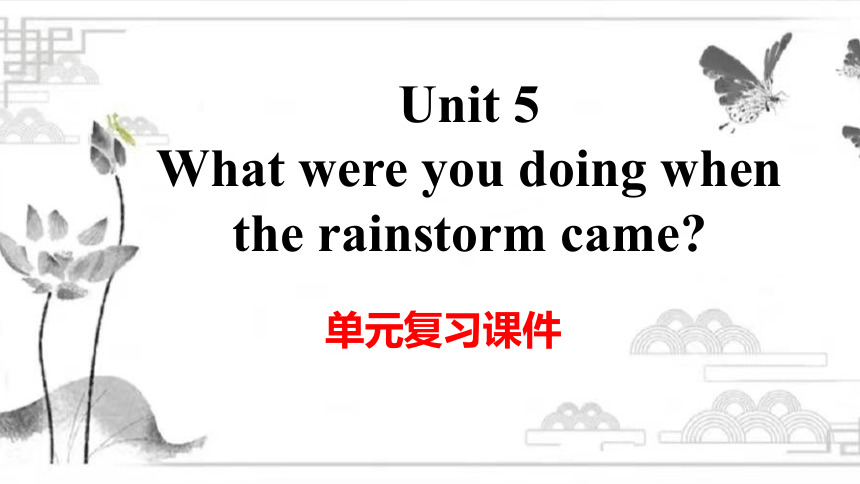 | |
| 格式 | zip | ||
| 文件大小 | 1.4MB | ||
| 资源类型 | 教案 | ||
| 版本资源 | 人教新目标(Go for it)版 | ||
| 科目 | 英语 | ||
| 更新时间 | 2023-04-10 14:03:51 | ||
图片预览

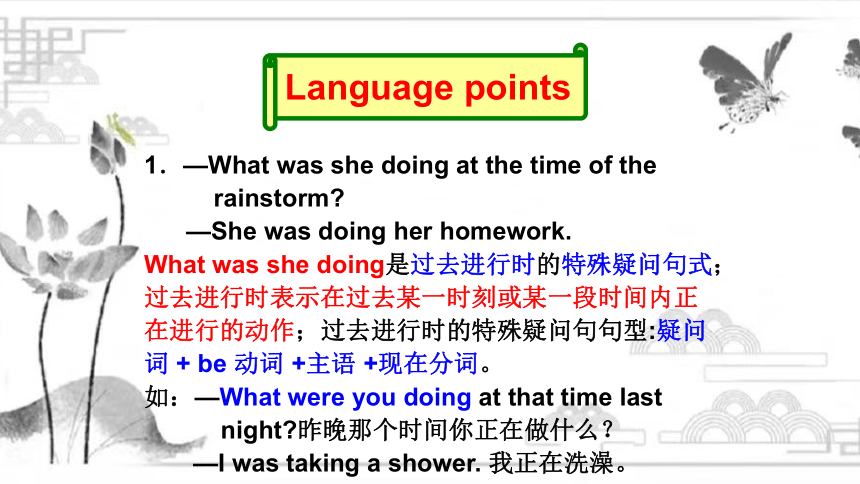
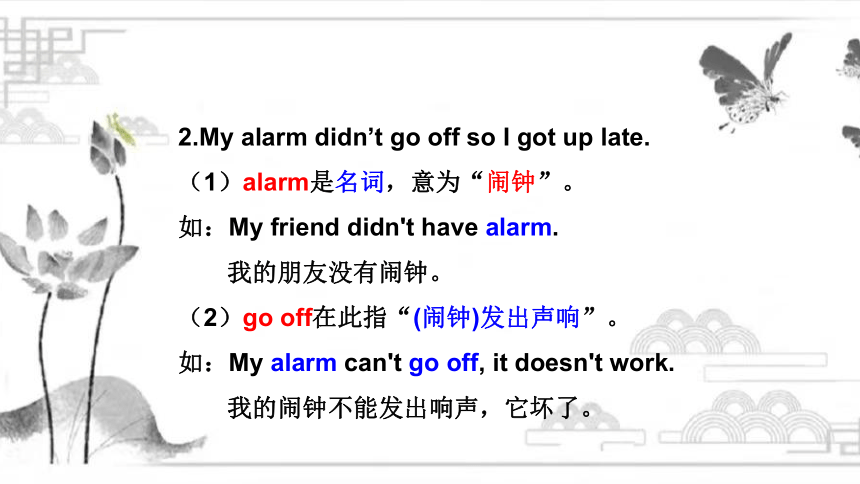

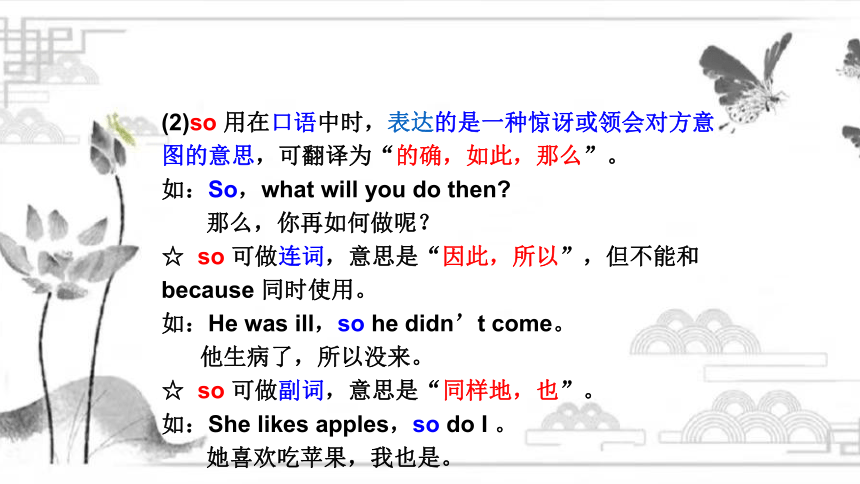
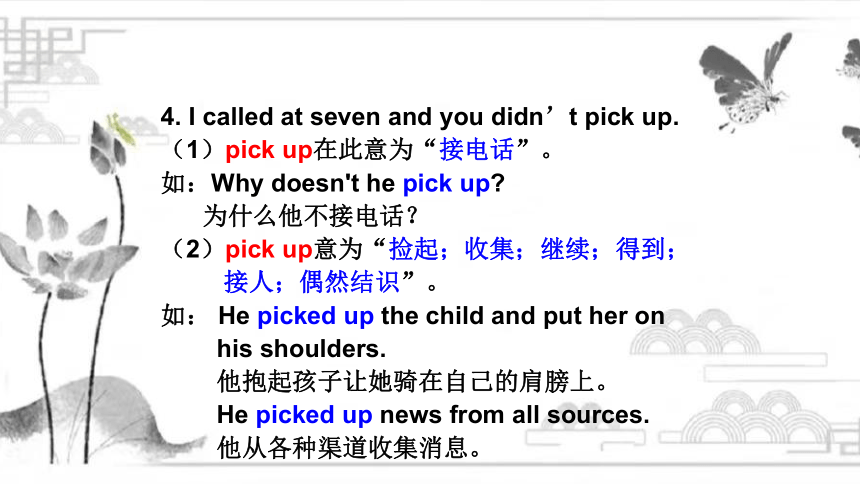
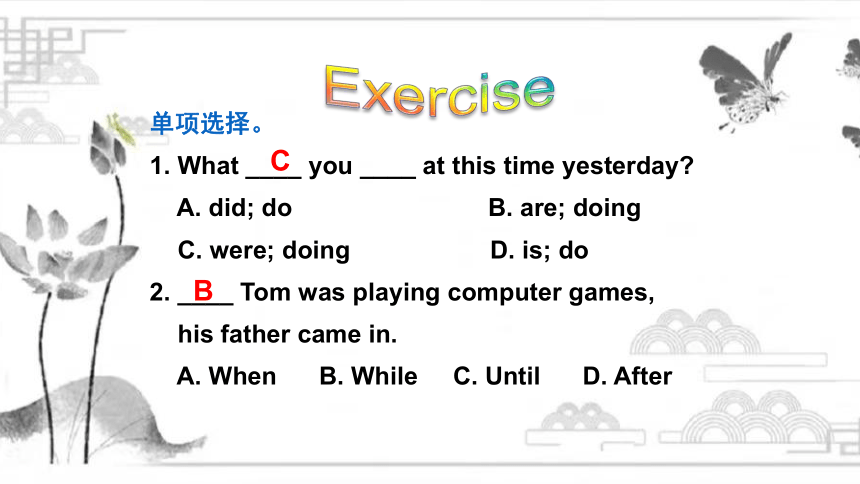
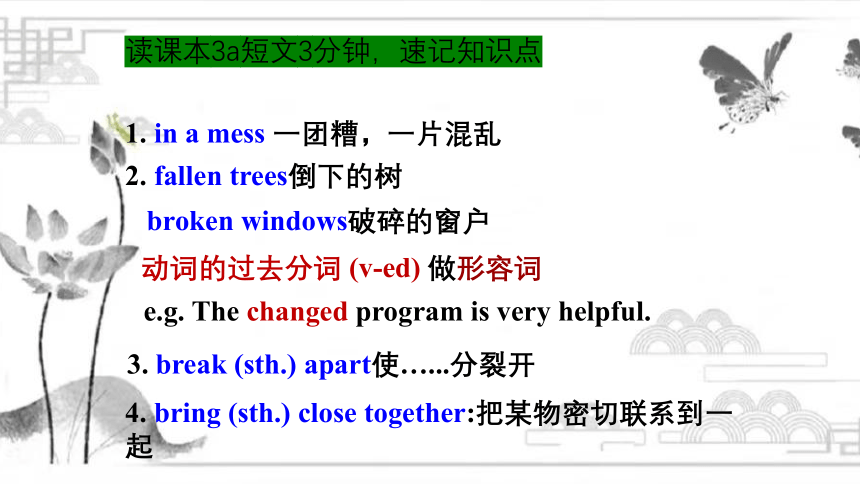
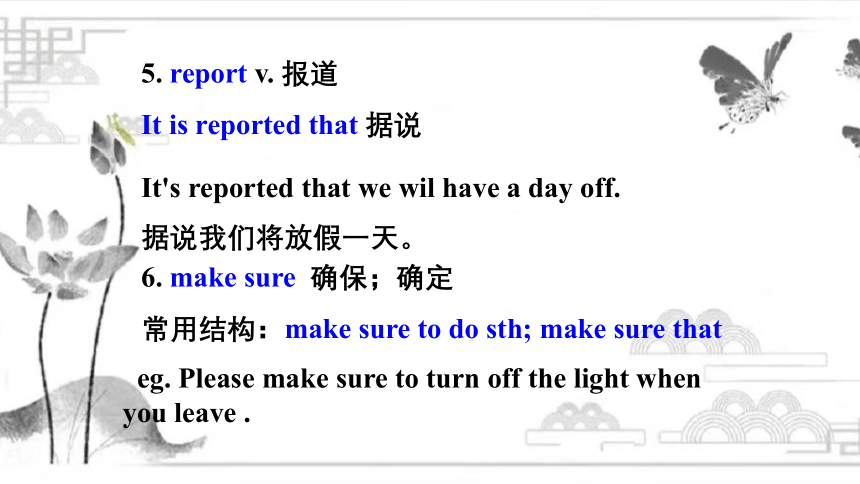
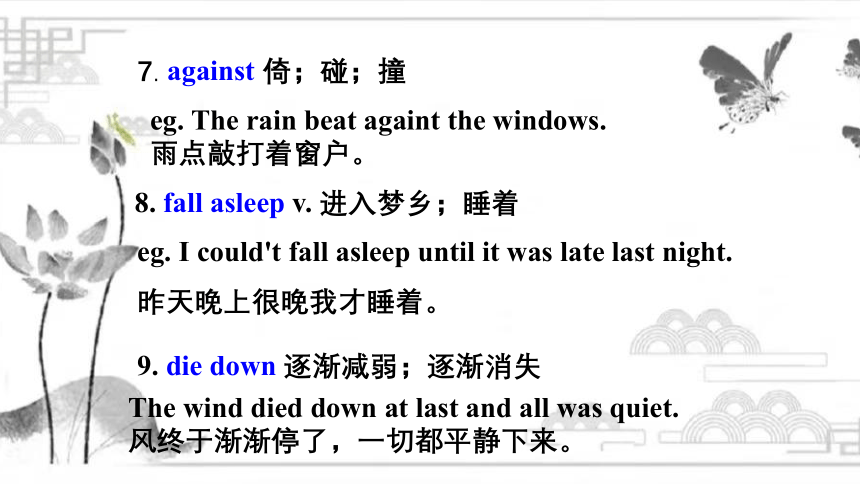
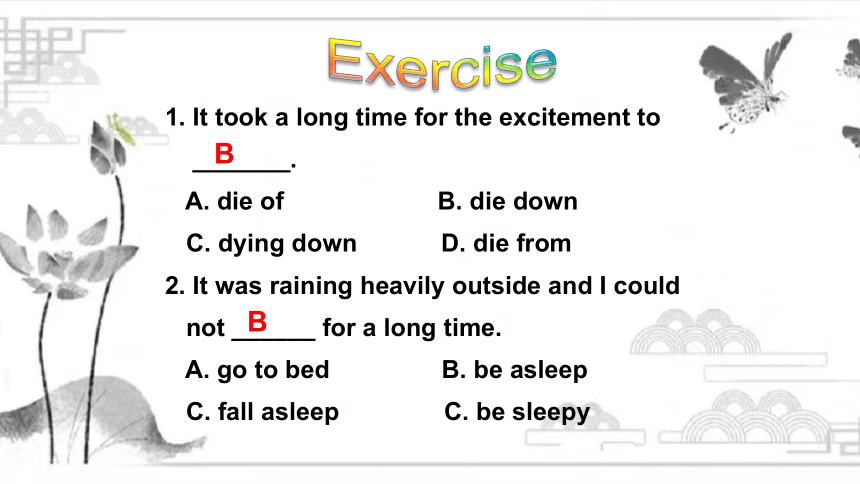
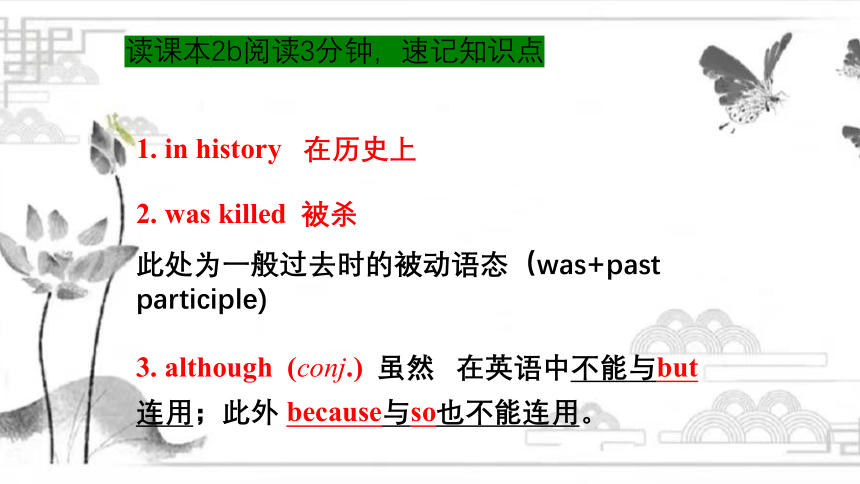
文档简介
(共31张PPT)
单元复习课件
Unit 5
What were you doing when the rainstorm came
Language points
1.—What was she doing at the time of the
rainstorm
—She was doing her homework.
What was she doing是过去进行时的特殊疑问句式;过去进行时表示在过去某一时刻或某一段时间内正在进行的动作;过去进行时的特殊疑问句句型:疑问词 + be 动词 +主语 +现在分词。
如:—What were you doing at that time last
night 昨晚那个时间你正在做什么?
—I was taking a shower. 我正在洗澡。
2.My alarm didn’t go off so I got up late.
(1)alarm是名词,意为“闹钟”。
如:My friend didn't have alarm.
我的朋友没有闹钟。
(2)go off在此指“(闹钟)发出声响”。
如:My alarm can't go off, it doesn't work.
我的闹钟不能发出响声,它坏了。
3. So when the rainstorm suddenly came, what were you doing
(1)suddenly是副词,意为“突然;忽然”。
如:We were talking on the phone when,
suddenly, the line went dead.
我们正通着电话,突然电话断了。
The curtain was suddenly drawn and a bright light shone in.
突然窗帘拉了开来,一道强光照了进来。
(2)so 用在口语中时,表达的是一种惊讶或领会对方意图的意思,可翻译为“的确,如此,那么”。
如:So,what will you do then
那么,你再如何做呢?
☆ so 可做连词,意思是“因此,所以”,但不能和because 同时使用。
如:He was ill,so he didn’t come。
他生病了,所以没来。
☆ so 可做副词,意思是“同样地,也”。
如:She likes apples,so do I 。
她喜欢吃苹果,我也是。
4. I called at seven and you didn’t pick up.
(1)pick up在此意为“接电话”。
如:Why doesn't he pick up
为什么他不接电话?
(2)pick up意为“捡起;收集;继续;得到;
接人;偶然结识”。
如: He picked up the child and put her on
his shoulders.
他抱起孩子让她骑在自己的肩膀上。
He picked up news from all sources.
他从各种渠道收集消息。
单项选择。
1. What ____ you ____ at this time yesterday
A. did; do B. are; doing
C. were; doing D. is; do
2. ____ Tom was playing computer games,
his father came in.
A. When B. While C. Until D. After
C
B
2. fallen trees倒下的树
broken windows破碎的窗户
动词的过去分词 (v-ed) 做形容词
e.g. The changed program is very helpful.
3. break (sth.) apart使…...分裂开
4. bring (sth.) close together:把某物密切联系到一起
1. in a mess 一团糟,一片混乱
读课本3a短文3分钟,速记知识点
6. make sure 确保;确定
常用结构:make sure to do sth; make sure that
eg. Please make sure to turn off the light when you leave .
5. report v. 报道
It is reported that 据说
It's reported that we wil have a day off.
据说我们将放假一天。
8. fall asleep v. 进入梦乡;睡着
eg. I could't fall asleep until it was late last night.
昨天晚上很晚我才睡着。
7. against 倚;碰;撞
eg. The rain beat againt the windows.
雨点敲打着窗户。
9. die down 逐渐减弱;逐渐消失
The wind died down at last and all was quiet.
风终于渐渐停了,一切都平静下来。
1. It took a long time for the excitement to
_______.
A. die of B. die down
C. dying down D. die from
2. It was raining heavily outside and I could
not ______ for a long time.
A. go to bed B. be asleep
C. fall asleep C. be sleepy
B
B
1. in history 在历史上
2. was killed 被杀
此处为一般过去时的被动语态(was+past participle)
3. although (conj.) 虽然 在英语中不能与but连用;此外 because与so也不能连用。
读课本2b阅读3分钟,速记知识点
4. over = more than 超过
e.g. There are over 7,000 students in our school.
在我们学校有七千多个学生。
5. on the radio 通过收音机
6. die 死亡 (动词)
强调死亡的瞬间动作,不能和一段时间连用。
e.g. My neighbor died for 10 years.
e.g. My neighbor died 10 years ago.
(T)
(F)
7. the rest of … 剩下的......
e.g. The rest of the students are from England.
剩下的学生来自于英格兰。
e.g. The rest of the paper is used for drawing.
剩下的纸是用来画画的。
8. in silence 安静地
e.g. They just sit there in silence.
他们只是很安静地坐在那里。
9. silent (adj.) 安静的
e.g. Please keep silent.
请保持安静。
10. World Trade Center = WTC 世界贸易中心
12. terrorist (n.) 恐怖分子
11. take down 拆除
13. have meaning to sb. 对某人来说有意义
e.g. This movie has special meaning to Lisa.
这部电影对于丽莎来说有特别的意义。
14. at first 起初,首先
at last 最后
15. so … that ... 如此…...以至于…...
e.g. My sister is so young that she can’t go to school by herself.
我妹妹是如此小以至于她不能自己去上学。
1. Don't _____ the window when the car is
running on the road. It's too dangerous.
A. look for B. look at
C. look out D. look up
2. He was ____ in a car accident.
A. kill B. to kill C. killed D. killing
3. ____ the water was cold, Wei Qinggang
jumped into it to save the little boy.
A. When B. Although C. If D. Because
C
C
B
4. The little boy made a mistake, when he
saw his father he was in ______.
A. silence B. silent
C. silently D. unsilence
5. When I got to school yesterday, I _____
I left my homework at home.
A. remember B. forgot
C. realized D. saw
A
C
Grammar
过去进行时(Past Progressive Tense)
语法概述
过去进行时表示在过去某一时刻或某一段时间正在进行的动作。其基本结构为“was/were+动词-ing”。
过去进行时的基本句式
The girl was shopping when I saw her.
主语 + was/were + v-ing+其他.
主语 + was/were + not + v-ing+其他.
He was not working at that time.
肯定句
否定句
—Were you playing basketball then
—Yes, I was. / No, I wasn't.
Was/Were + 主语 + v-ing + 其他
特殊疑问词 + was/were + 主语 + v-ing + 其他
—What were you doing at nine last Sunday morning
—I was reading.
一般
疑问句
特殊
疑问句
肯定回答:
Yes, 主语+was/were.
否定回答:
No, 主语+wasn't/weren't.
过去进行时的基本句式
过去进行时的基本用法
I was watching TV the whole night.
We were having classes all day yesterday.
◆ 表示过去某一段时间内一直进行的动作,常与the whole day, all day yesterday等时间状语连用。有时没有明显的时间状语,可根据上下文语境判断。
过去进行时的基本用法
Miss Li was shopping at this time yesterday.
I was looking for my lost cat at nine last Monday morning.
◆ 表示过去某一时刻正在进行或发生的动作,与表示过去某一时间点的时间状语连用,如at 3 o'clock yesterday afternoon, at this time yesterday等。
过去进行时
含义: 表示过去某个时刻
正在进行的动作。
结构:
was/were + doing
例句:
I was having an English
class at this time yesterday.
现在进行时
含义: 表示现在
正在进行的动作。
结构:
is/am/are + doing
例句:
I am having an English
class.
Fill in the blanks.
1. What ____ (be) you _____ (do) when he arrived
2. Jim____________ (sleep) when I came in.
3. They _____________ (watch) TV at 8:00 yesterday evening.
4. Now he _________ (read) and ______ (write).
were doing
was sleeping
were watching
is reading writing
Exercise
when 与 while 引导的时间状语从句
when和while都可意为“当······时”,用来引导时间状语从句,表示主句动作发生的背景。
语法概述
When和while的区别
When I arrived at home, my mum was cooking.
主句的动作时持续的,而从句的动作是短暂的,此时用_________引导时间状语从句,主句用_________时态,从句用________时态。
when
过去进行
一般过去
主句
从句
短暂性动词(短动作)
延续性动词(长动作)
When和while的区别
2. I arrived at home while/when my mum was cooking.
主句的动作是短暂性的,从句的动作是持续性的,此时用___________引导从句,主句用_________时态,从句用__________时态。
while/when
一般过去
过去进行
从句
主句
短暂性动词(短动作)
延续性动词(长动作)
When和while的区别
3.I was watching TV while my mother was cooking.
主句和从句的动作在过去的某时刻或某时段同时发生,而且动作都是持续性的,此时用________引导从句,并且主句和从句都用___________时态。
while
过去进行
主句
从句
长动作
长动作
1. _______ we were talking in the classroom,
the teacher came in.
2. _______ they got to the airport,it was raining.
3. _______ she was reading a book, the
phone rang.
4. _______ I saw the boy, he was wearing
a new coat.
5. _______ he was reading, he fell asleep.
Ⅱ. 用when或while填空。
While
When
While
When
While
单元复习课件
Unit 5
What were you doing when the rainstorm came
Language points
1.—What was she doing at the time of the
rainstorm
—She was doing her homework.
What was she doing是过去进行时的特殊疑问句式;过去进行时表示在过去某一时刻或某一段时间内正在进行的动作;过去进行时的特殊疑问句句型:疑问词 + be 动词 +主语 +现在分词。
如:—What were you doing at that time last
night 昨晚那个时间你正在做什么?
—I was taking a shower. 我正在洗澡。
2.My alarm didn’t go off so I got up late.
(1)alarm是名词,意为“闹钟”。
如:My friend didn't have alarm.
我的朋友没有闹钟。
(2)go off在此指“(闹钟)发出声响”。
如:My alarm can't go off, it doesn't work.
我的闹钟不能发出响声,它坏了。
3. So when the rainstorm suddenly came, what were you doing
(1)suddenly是副词,意为“突然;忽然”。
如:We were talking on the phone when,
suddenly, the line went dead.
我们正通着电话,突然电话断了。
The curtain was suddenly drawn and a bright light shone in.
突然窗帘拉了开来,一道强光照了进来。
(2)so 用在口语中时,表达的是一种惊讶或领会对方意图的意思,可翻译为“的确,如此,那么”。
如:So,what will you do then
那么,你再如何做呢?
☆ so 可做连词,意思是“因此,所以”,但不能和because 同时使用。
如:He was ill,so he didn’t come。
他生病了,所以没来。
☆ so 可做副词,意思是“同样地,也”。
如:She likes apples,so do I 。
她喜欢吃苹果,我也是。
4. I called at seven and you didn’t pick up.
(1)pick up在此意为“接电话”。
如:Why doesn't he pick up
为什么他不接电话?
(2)pick up意为“捡起;收集;继续;得到;
接人;偶然结识”。
如: He picked up the child and put her on
his shoulders.
他抱起孩子让她骑在自己的肩膀上。
He picked up news from all sources.
他从各种渠道收集消息。
单项选择。
1. What ____ you ____ at this time yesterday
A. did; do B. are; doing
C. were; doing D. is; do
2. ____ Tom was playing computer games,
his father came in.
A. When B. While C. Until D. After
C
B
2. fallen trees倒下的树
broken windows破碎的窗户
动词的过去分词 (v-ed) 做形容词
e.g. The changed program is very helpful.
3. break (sth.) apart使…...分裂开
4. bring (sth.) close together:把某物密切联系到一起
1. in a mess 一团糟,一片混乱
读课本3a短文3分钟,速记知识点
6. make sure 确保;确定
常用结构:make sure to do sth; make sure that
eg. Please make sure to turn off the light when you leave .
5. report v. 报道
It is reported that 据说
It's reported that we wil have a day off.
据说我们将放假一天。
8. fall asleep v. 进入梦乡;睡着
eg. I could't fall asleep until it was late last night.
昨天晚上很晚我才睡着。
7. against 倚;碰;撞
eg. The rain beat againt the windows.
雨点敲打着窗户。
9. die down 逐渐减弱;逐渐消失
The wind died down at last and all was quiet.
风终于渐渐停了,一切都平静下来。
1. It took a long time for the excitement to
_______.
A. die of B. die down
C. dying down D. die from
2. It was raining heavily outside and I could
not ______ for a long time.
A. go to bed B. be asleep
C. fall asleep C. be sleepy
B
B
1. in history 在历史上
2. was killed 被杀
此处为一般过去时的被动语态(was+past participle)
3. although (conj.) 虽然 在英语中不能与but连用;此外 because与so也不能连用。
读课本2b阅读3分钟,速记知识点
4. over = more than 超过
e.g. There are over 7,000 students in our school.
在我们学校有七千多个学生。
5. on the radio 通过收音机
6. die 死亡 (动词)
强调死亡的瞬间动作,不能和一段时间连用。
e.g. My neighbor died for 10 years.
e.g. My neighbor died 10 years ago.
(T)
(F)
7. the rest of … 剩下的......
e.g. The rest of the students are from England.
剩下的学生来自于英格兰。
e.g. The rest of the paper is used for drawing.
剩下的纸是用来画画的。
8. in silence 安静地
e.g. They just sit there in silence.
他们只是很安静地坐在那里。
9. silent (adj.) 安静的
e.g. Please keep silent.
请保持安静。
10. World Trade Center = WTC 世界贸易中心
12. terrorist (n.) 恐怖分子
11. take down 拆除
13. have meaning to sb. 对某人来说有意义
e.g. This movie has special meaning to Lisa.
这部电影对于丽莎来说有特别的意义。
14. at first 起初,首先
at last 最后
15. so … that ... 如此…...以至于…...
e.g. My sister is so young that she can’t go to school by herself.
我妹妹是如此小以至于她不能自己去上学。
1. Don't _____ the window when the car is
running on the road. It's too dangerous.
A. look for B. look at
C. look out D. look up
2. He was ____ in a car accident.
A. kill B. to kill C. killed D. killing
3. ____ the water was cold, Wei Qinggang
jumped into it to save the little boy.
A. When B. Although C. If D. Because
C
C
B
4. The little boy made a mistake, when he
saw his father he was in ______.
A. silence B. silent
C. silently D. unsilence
5. When I got to school yesterday, I _____
I left my homework at home.
A. remember B. forgot
C. realized D. saw
A
C
Grammar
过去进行时(Past Progressive Tense)
语法概述
过去进行时表示在过去某一时刻或某一段时间正在进行的动作。其基本结构为“was/were+动词-ing”。
过去进行时的基本句式
The girl was shopping when I saw her.
主语 + was/were + v-ing+其他.
主语 + was/were + not + v-ing+其他.
He was not working at that time.
肯定句
否定句
—Were you playing basketball then
—Yes, I was. / No, I wasn't.
Was/Were + 主语 + v-ing + 其他
特殊疑问词 + was/were + 主语 + v-ing + 其他
—What were you doing at nine last Sunday morning
—I was reading.
一般
疑问句
特殊
疑问句
肯定回答:
Yes, 主语+was/were.
否定回答:
No, 主语+wasn't/weren't.
过去进行时的基本句式
过去进行时的基本用法
I was watching TV the whole night.
We were having classes all day yesterday.
◆ 表示过去某一段时间内一直进行的动作,常与the whole day, all day yesterday等时间状语连用。有时没有明显的时间状语,可根据上下文语境判断。
过去进行时的基本用法
Miss Li was shopping at this time yesterday.
I was looking for my lost cat at nine last Monday morning.
◆ 表示过去某一时刻正在进行或发生的动作,与表示过去某一时间点的时间状语连用,如at 3 o'clock yesterday afternoon, at this time yesterday等。
过去进行时
含义: 表示过去某个时刻
正在进行的动作。
结构:
was/were + doing
例句:
I was having an English
class at this time yesterday.
现在进行时
含义: 表示现在
正在进行的动作。
结构:
is/am/are + doing
例句:
I am having an English
class.
Fill in the blanks.
1. What ____ (be) you _____ (do) when he arrived
2. Jim____________ (sleep) when I came in.
3. They _____________ (watch) TV at 8:00 yesterday evening.
4. Now he _________ (read) and ______ (write).
were doing
was sleeping
were watching
is reading writing
Exercise
when 与 while 引导的时间状语从句
when和while都可意为“当······时”,用来引导时间状语从句,表示主句动作发生的背景。
语法概述
When和while的区别
When I arrived at home, my mum was cooking.
主句的动作时持续的,而从句的动作是短暂的,此时用_________引导时间状语从句,主句用_________时态,从句用________时态。
when
过去进行
一般过去
主句
从句
短暂性动词(短动作)
延续性动词(长动作)
When和while的区别
2. I arrived at home while/when my mum was cooking.
主句的动作是短暂性的,从句的动作是持续性的,此时用___________引导从句,主句用_________时态,从句用__________时态。
while/when
一般过去
过去进行
从句
主句
短暂性动词(短动作)
延续性动词(长动作)
When和while的区别
3.I was watching TV while my mother was cooking.
主句和从句的动作在过去的某时刻或某时段同时发生,而且动作都是持续性的,此时用________引导从句,并且主句和从句都用___________时态。
while
过去进行
主句
从句
长动作
长动作
1. _______ we were talking in the classroom,
the teacher came in.
2. _______ they got to the airport,it was raining.
3. _______ she was reading a book, the
phone rang.
4. _______ I saw the boy, he was wearing
a new coat.
5. _______ he was reading, he fell asleep.
Ⅱ. 用when或while填空。
While
When
While
When
While
同课章节目录
- Unit 1 What's the matter?
- Section A
- Section B
- Unit 2 I'll help to clean up the city parks.
- Section A
- Section B
- Unit 3 Could you please clean your room?
- Section A
- Section B
- Unit 4 Why don't you talk to your parents?
- Section A
- Section B
- Unit 5 What were you doing when the rainstorm came
- Section A
- Section B
- Review of Units 1-5
- Unit 6 An old man tried to move the mountains.
- Section A
- Section B
- Unit 7 What's the highest mountain in the world?
- Section A
- Section B
- Unit 8 Have you read Treasure Island yet?
- Section A
- Section B
- Unit 9 Have you ever been to a museum?
- Section A
- Section B
- Unit 10 I've had this bike for three years.
- Section A
- Section B
